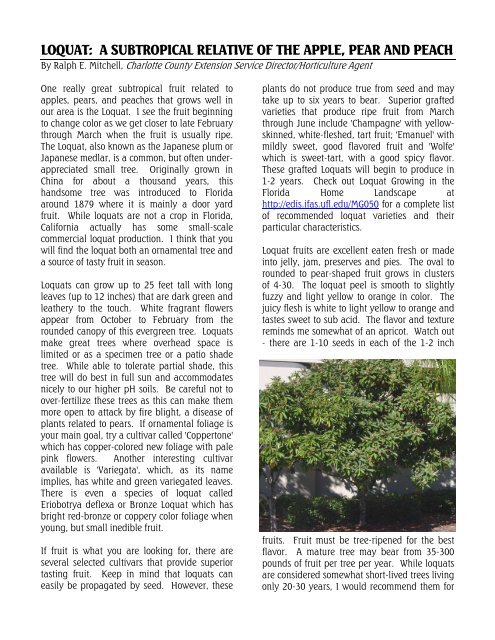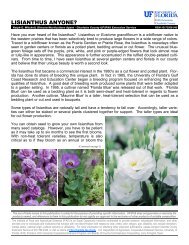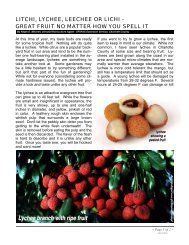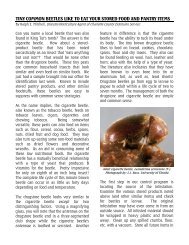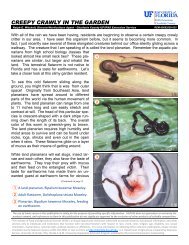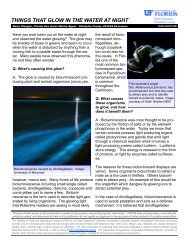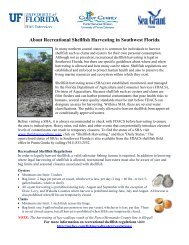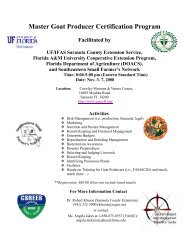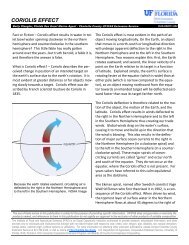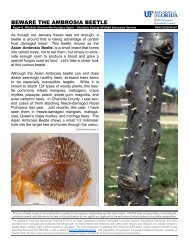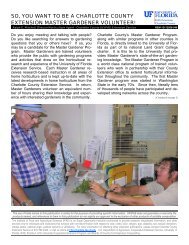Loquat: A Subtropical Relative of the Apple, Pear, and Peach
Loquat: A Subtropical Relative of the Apple, Pear, and Peach
Loquat: A Subtropical Relative of the Apple, Pear, and Peach
You also want an ePaper? Increase the reach of your titles
YUMPU automatically turns print PDFs into web optimized ePapers that Google loves.
LOQUAT: A SUBTROPICAL RELATIVE OF THE APPLE, PEAR AND PEACH<br />
By Ralph E. Mitchell, Charlotte County Extension Service Director/Horticulture Agent<br />
One really great subtropical fruit related to<br />
apples, pears, <strong>and</strong> peaches that grows well in<br />
our area is <strong>the</strong> <strong>Loquat</strong>. I see <strong>the</strong> fruit beginning<br />
to change color as we get closer to late February<br />
through March when <strong>the</strong> fruit is usually ripe.<br />
The <strong>Loquat</strong>, also known as <strong>the</strong> Japanese plum or<br />
Japanese medlar, is a common, but <strong>of</strong>ten underappreciated<br />
small tree. Originally grown in<br />
China for about a thous<strong>and</strong> years, this<br />
h<strong>and</strong>some tree was introduced to Florida<br />
around 1879 where it is mainly a door yard<br />
fruit. While loquats are not a crop in Florida,<br />
California actually has some small-scale<br />
commercial loquat production. I think that you<br />
will find <strong>the</strong> loquat both an ornamental tree <strong>and</strong><br />
a source <strong>of</strong> tasty fruit in season.<br />
<strong>Loquat</strong>s can grow up to 25 feet tall with long<br />
leaves (up to 12 inches) that are dark green <strong>and</strong><br />
lea<strong>the</strong>ry to <strong>the</strong> touch. White fragrant flowers<br />
appear from October to February from <strong>the</strong><br />
rounded canopy <strong>of</strong> this evergreen tree. <strong>Loquat</strong>s<br />
make great trees where overhead space is<br />
limited or as a specimen tree or a patio shade<br />
tree. While able to tolerate partial shade, this<br />
tree will do best in full sun <strong>and</strong> accommodates<br />
nicely to our higher pH soils. Be careful not to<br />
over-fertilize <strong>the</strong>se trees as this can make <strong>the</strong>m<br />
more open to attack by fire blight, a disease <strong>of</strong><br />
plants related to pears. If ornamental foliage is<br />
your main goal, try a cultivar called 'Coppertone'<br />
which has copper-colored new foliage with pale<br />
pink flowers. Ano<strong>the</strong>r interesting cultivar<br />
available is 'Variegata', which, as its name<br />
implies, has white <strong>and</strong> green variegated leaves.<br />
There is even a species <strong>of</strong> loquat called<br />
Eriobotrya deflexa or Bronze <strong>Loquat</strong> which has<br />
bright red-bronze or coppery color foliage when<br />
young, but small inedible fruit.<br />
If fruit is what you are looking for, <strong>the</strong>re are<br />
several selected cultivars that provide superior<br />
tasting fruit. Keep in mind that loquats can<br />
easily be propagated by seed. However, <strong>the</strong>se<br />
plants do not produce true from seed <strong>and</strong> may<br />
take up to six years to bear. Superior grafted<br />
varieties that produce ripe fruit from March<br />
through June include 'Champagne' with yellowskinned,<br />
white-fleshed, tart fruit; 'Emanuel' with<br />
mildly sweet, good flavored fruit <strong>and</strong> 'Wolfe'<br />
which is sweet-tart, with a good spicy flavor.<br />
These grafted <strong>Loquat</strong>s will begin to produce in<br />
1-2 years. Check out <strong>Loquat</strong> Growing in <strong>the</strong><br />
Florida Home L<strong>and</strong>scape at<br />
http://edis.ifas.ufl.edu/MG050 for a complete list<br />
<strong>of</strong> recommended loquat varieties <strong>and</strong> <strong>the</strong>ir<br />
particular characteristics.<br />
<strong>Loquat</strong> fruits are excellent eaten fresh or made<br />
into jelly, jam, preserves <strong>and</strong> pies. The oval to<br />
rounded to pear-shaped fruit grows in clusters<br />
<strong>of</strong> 4-30. The loquat peel is smooth to slightly<br />
fuzzy <strong>and</strong> light yellow to orange in color. The<br />
juicy flesh is white to light yellow to orange <strong>and</strong><br />
tastes sweet to sub acid. The flavor <strong>and</strong> texture<br />
reminds me somewhat <strong>of</strong> an apricot. Watch out<br />
- <strong>the</strong>re are 1-10 seeds in each <strong>of</strong> <strong>the</strong> 1-2 inch<br />
fruits. Fruit must be tree-ripened for <strong>the</strong> best<br />
flavor. A mature tree may bear from 35-300<br />
pounds <strong>of</strong> fruit per tree per year. While loquats<br />
are considered somewhat short-lived trees living<br />
only 20-30 years, I would recommend <strong>the</strong>m for
every l<strong>and</strong>scape. <strong>Loquat</strong>s look tropical, are hardy <strong>and</strong> somewhat drought tolerant, <strong>and</strong> provide a tasty<br />
crop <strong>of</strong> fruit on a yearly basis. Late February <strong>and</strong> March starts <strong>the</strong> season for this fruit when few o<strong>the</strong>r<br />
fruits are readily available. Try this tree <strong>and</strong> its tasty fruit this year!<br />
For more information on all types <strong>of</strong> fruit trees <strong>and</strong> o<strong>the</strong>r gardening issues, please contact our Master<br />
Gardeners on <strong>the</strong> Plant Lifeline at 941.764.4340 from 1:00pm-4:00pm Mondays, Wednesdays, <strong>and</strong> Fridays.<br />
Our <strong>of</strong>fice is located at 25550 Harbor View Road, Suite 3, in Port Charlotte. Our Plant Clinics are available<br />
across <strong>the</strong> county:<br />
‣ Demonstration Garden (6900 Florida Streeet, PG) Thursdays 9:00am-11:00am.<br />
‣ Englewood/Charlotte Public Library Thursdays 10:00am-1:00pm.<br />
‣ Mid-County Regional Library 1 st <strong>and</strong> 3 rd Thursday <strong>of</strong> month 1:00pm-3:00pm.<br />
‣ Edison College Learning Resources Library 3 rd Tuesday <strong>of</strong> month 1:00pm-4:00pm.<br />
‣ South Gulf Cove Learning Garden 3 rd Wednesday <strong>of</strong> month 9:00am-12:00pm.<br />
Monthly Plant Clinics are Saturdays 9:00am-12:00pm at <strong>the</strong> following locations:<br />
‣ <strong>Peach</strong>l<strong>and</strong> Promenades Publix 2 nd Saturday <strong>of</strong> month.<br />
‣ Home Depot Murdock & Home Depot Punta Gorda 3 rd Saturday <strong>of</strong> month.<br />
‣ Lowes Garden Center Murdock 4 th Saturday <strong>of</strong> month.<br />
Ralph Mitchell is <strong>the</strong> County Extension Director/Horticulture Agent for <strong>the</strong> Charlotte County Cooperative<br />
Extension Service. You may contact him by email (Ralph.Mitchell@charlottefl.com). You may also contact a<br />
volunteer Master Gardener 1:00pm-4:00pm Monday, Wednesday, <strong>and</strong> Friday at 941.764.4340 or by email<br />
(Master.Gardener@charlottefl.com).<br />
For more information about our Florida Yards <strong>and</strong> Neighborhoods Program, please contact our FYN<br />
Horticulture Program Assistant, Allison Steele, at 941.764.4340. Allison can help educate you about <strong>the</strong><br />
Florida Yards & Neighborhoods Program so that you can create a beautiful, Florida-Friendly l<strong>and</strong>scape that<br />
saves you time <strong>and</strong> money while conserving precious water resources <strong>and</strong> reducing pollution.<br />
Resource:<br />
Gilman, E.F. & Watson, D.G. (2007) Eriobaotrya japonica: <strong>Loquat</strong>, UF/IFAS Extension Service.<br />
Gilman, E.F. & Watson, D.G. (2006) Eriobotrya deflexa: Bronze <strong>Loquat</strong>, UF/IFAS Extension Service.<br />
Gilman, E.F. & Watson, D.G. (2007) Eriobotrya japonica 'Coppertone': 'Coppertone' <strong>Loquat</strong>, UF/IFAS<br />
Extension Service.<br />
Gilman, E.F. & Watson, D.G. (2007), Eriobotrya japonica 'Variegata': 'Variegata' <strong>Loquat</strong> UF/IFAS<br />
Extension Service.<br />
Crane, J.H. <strong>and</strong> Caldeira, M.L. (2006), <strong>Loquat</strong> Growing in <strong>the</strong> Florida Home L<strong>and</strong>scape, UF/IFAS<br />
Extension Service.


